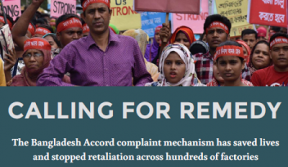My salary is far less than my monthly expenses and I struggle to
make ends meet. We get sick leave, and maternity leave – but we only
get 3 months leave for ‘maternity leave’. The kind of work we do is
tedious and strenuous. We’ve asked the farmers to reconsider our
salaries. That’s when they promise us that they will reconsider and
come back to us, but they never do. The women stuck in there jobs don’t
seem to mind or get too worried about it. There are 16 women that work
with me, and we work all year round. It’s unfortunate that we get such
little compensation for the amount of work done. We are constantly
threatened by the farmers who fire those that stand up against the
unfair pay. The farmers sometimes say they can’t pay out increases and
if concerns continue to be voiced they then tell us that they’ll just
close the farm.
There are various practices that seem unsafe and unhealthy at work.
One of my safety concerns is that to achieve the roundness of the dried
apple rings after they leave the machine; they are currently being cut
by hand. If we had machines that could do all the cutting, people
wouldn’t be cutting themselves and exposing their bodies to various
infections. Another example is that some of the women work without
shoes and they’re always standing. You wouldn’t believe how many of my
colleagues complain about their backs. One of the two things I’d like
to change at work is that the apples (to make the dried apple rings)
are not cut by hand. If we could have a machine that does that, then
we’d be able to work efficiently, effectively and we’d reduce the
amount of injuries experienced on this farm. The second thing I’d like
to change is the rule that prohibits women from wearing shoes in the
workplace. Our feet are always covered by water, it’s unhygienic, and
standing all day hurts my back.
Jolene is active with an organization in South Africa called REACH.
ILRF has worked on many projects with REACH over the years. The Rural
Education, Awareness and Community Health (REACH) is a Non-Profit and
Public Benefit Organization that seeks to sensitize rural farming
countries, and other relevant stakeholders in he Western Cape, on the
issues of sexual harassment and sexual violence, through the
implementation of programs that encourage ethical, social, personal
awareness and development. REACH seeks to educate and empower women to
improve their rights and, in turn, contribute to the eradication of
sexual harassment and sexual violence. More information about REACH is
available at http://www.laborrights.org/rights-for-working-women/partner-spotlight/reach-in-south-africa

